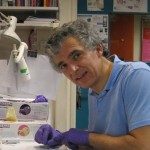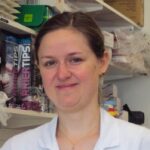Link to Pubmed [PMID] – 35417240
Link to DOI – 10.1126/sciadv.abl5942
Sci Adv 2022 Apr; 8(15): eabl5942
Adenomatous polyposis coli (APC) is a tumor suppressor whose mutations underlie familial adenomatous polyposis (FAP) and colorectal cancer. Although its role in intestinal epithelial cells is well characterized, APC importance in T cell biology is ill defined. APC regulates cytoskeleton organization, cell polarity, and migration in various cell types. Here, we address whether APC plays a role in T lymphocyte migration. Using a series of cell biology tools, we unveiled that T cells from FAP patients carrying APC mutations display impaired adhesion and motility in constrained environments. We further dissected the cellular mechanisms underpinning these defects in APC-depleted CEM T cell line that recapitulate the phenotype observed in FAP T cells. We found that APC affects T cell motility by modulating integrin-dependent adhesion and cytoskeleton reorganization. Hence, APC mutations in FAP patients not only drive intestinal neoplasms but also impair T cell migration, potentially contributing to inefficient antitumor immunity.










